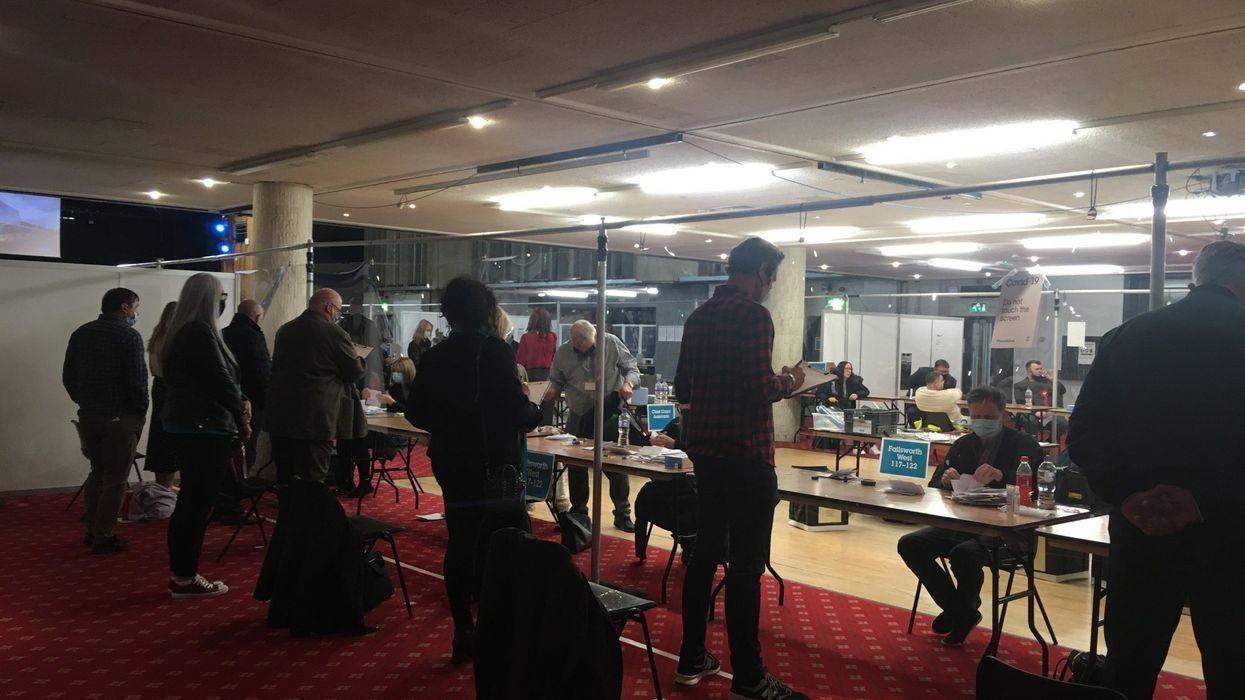By Charlotte Green
LABOUR'S stronghold in Oldham has been dealt a shattering blow after the incumbent council leader was defeated by a new independent party.
Sean Fielding, who became leader in May 2018 at the age of just 28 after ousting incumbent Jean Stretton from the top job, lost his seat in a dramatic and depressing night for Labour.
His seat was won by Mark Wilkinson, of the newly formed Failsworth Independent Party.
The mood at the count was gloomy well before results were officially announced, and Labour was subsequently confirmed to have lost a further five seats – including one which was vacant but had previously been held by the party.
There were 20 seats – a third of the council – up for grabs in the borough.
Labour held 15 of these going into the election, with the rest divided between three Liberal Democrat-held seats, one Conservative seat, and one held by independent Aftab Hussain.
While many Labour members had already said they were expecting a close run battle after an acrimonious campaign, it was clear the news of Fielding’s defeat was disastrous.
He was first elected as a councillor for Failsworth West in 2012, and became a key ally of then leader Jim McMahon, taking on an assistant cabinet position before achieving the leadership.
In his time in office he oversaw the commissioning of a review into allegations of historic child sexual exploitation in the borough and spearheaded multi-million pound plans for regenerating the town centre.
He was supportive of Andy Burnham and served as portfolio holder for employment, skills and digital on the Greater Manchester Combined Authority.
In recent years Fielding had become arguably a more controversial leader as his attitude towards his critics both on social media and in the council chamber proved divisive.
At Thursday’s (6) election he faced a stiff challenge in his hometown of Failsworth from the newly formed Failsworth Independent Party, which already counted independent councillor Brian Hobin among its ranks.
In a shock result which came through much later than in previous years, after the Covid-19 pandemic forced a shakeup of election count procedures, Fielding was beaten by 191 votes, with 1,281 votes to Wilkinson’s 1,472.
Fielding left the Queen Elizabeth Hall after the voted had been verified but before they were counted.
However, in a statement delivered after the result was confirmed by chief executive Carolyn Wilkins he said: “While tonight is obviously disappointing, the electorate of Failsworth West have spoken.
“It’s no secret that I have been saddened by the tone of the campaign both politically and personally.
“I have served Failsworth as a councillor for nine years, ensuring local green belt is protected, reinstating local youth services and saving vital bus routes.
“I have also been privileged to serve the borough as council leader for the last three years, steering Oldham through the unprecedented challenge presented by Covid and developing a new vision for the town centre.
“I’m incredibly proud of what we have been able to achieve as a Labour council during my time as leader. All at a time of savage austerity cuts to vital public services.
“And I’m also proud that I’ve been ambitious for Oldham, the town where I was born and brought up, and where I still call home.
“That ambition is unwavering, although I’m no longer serving as leader. The people of Failsworth and of Oldham deserve the very best.”
The Failsworth Independent Party’s other candidate Neil Hindle also comfortably unseated Labour incumbent Liz Jacques in Failsworth East ward.
Her husband Paul Jacques had been previously ousted in the 2019 elections by Brian Hobin.
Ms Jacques was defeated by 736 votes, with Mr Hindle winning 1,765.
The two winning candidates and their campaign team were jubilant, with cheers erupting from the count floor when the results were announced.
Coun Hobin described it as a ‘fantastic’ result.
“We’re very grateful to the people of Failsworth for having faith in our team and are looking forward to working with the community for the area we all love and live in,” he added.
“One of the major points for our success is our community involvement and spirit.”
Two more Labour councillors, Ateeque Ur-Rehman in Medlock Vale, and Cath Ball in St James ward – were defeated by Conservative candidates Sahr Abid and Beth Sharp respectively.
Labour also lost the Saddleworth West and Lees seat to the Liberal Democrats’ candidate Mark Kenyon, who narrowly beat hyper-local party Proud of Oldham and Saddleworth candidate Paul Shilton by just 42 votes.
The Proud of Oldham and Saddleworth Party had contested eight seats, and while they came second place in several, were not successful in electing a candidate.
The Conservative party also triumphed in the Saddleworth North and South wards.
The Tories managed to unseat Liberal Democrat incumbent Garth Harkness in Saddleworth North with their candidate Luke Lancaster.
The party also retained Saddleworth South, the seat held by former Mayor and Conservative stalwart John Hudson, with their new candidate and young parish councillor Max Woodvine.
While the key Labour losses were the main story of the night, it was one-up, one-down for the Liberal Democrats who saw one of their main frontbenchers ousted, but won in Saddleworth West and Lees.
They also retained Shaw ward with candidate Howard Sykes and Crompton with candidate Diane Williamson.
It leaves the political makeup of the council as 40 Labour councillors, eight Liberal Democrats, eight Conservatives, three Failsworth Independent Party members and one independent councillor.
(Local Democracy Reporting Service)




